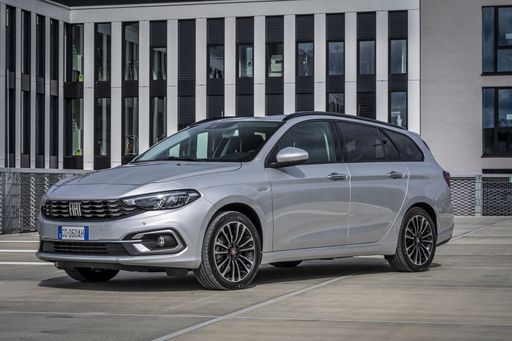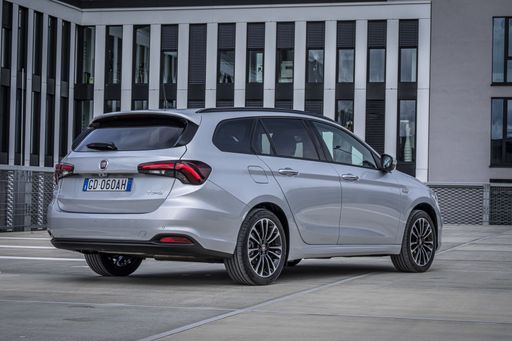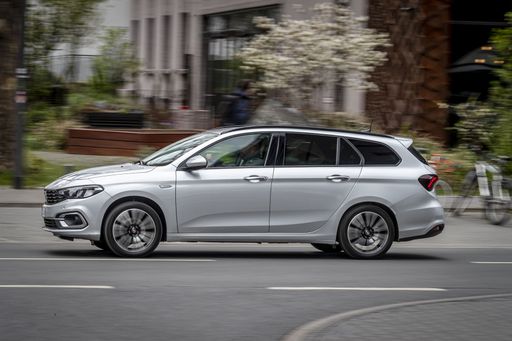Fiat Tipo Wagon vs Toyota Yaris – Which model is better for everyday use?
Compare performance, boot capacity, efficiency and price at a glance.
Find out which car is the better choice for you – Fiat Tipo Wagon or Toyota Yaris?
Costs and Efficiency:
Price and efficiency are often the first things buyers look at. Here it becomes clear which model has the long-term edge – whether at the pump, the plug, or in purchase price.
Fiat Tipo Wagon has a hardly perceptible advantage in terms of price – it starts at 21000 £, while the Toyota Yaris costs 21900 £. That’s a price difference of around 866 £.
Fuel consumption also shows a difference: Toyota Yaris manages with 3.80 L and is therefore clearly perceptible more efficient than the Fiat Tipo Wagon with 4.70 L. The difference is about 0.90 L per 100 km.
Engine and Performance:
Power, torque and acceleration are the classic benchmarks for car enthusiasts – and here, some clear differences start to show.
When it comes to engine power, the Toyota Yaris has a decisively edge – offering 280 HP compared to 130 HP. That’s roughly 150 HP more horsepower.
In acceleration from 0 to 100 km/h, the Toyota Yaris is convincingly quicker – completing the sprint in 5.50 s, while the Fiat Tipo Wagon takes 9.10 s. That’s about 3.60 s faster.
In terms of top speed, the Toyota Yaris performs hardly perceptible better – reaching 230 km/h, while the Fiat Tipo Wagon tops out at 207 km/h. The difference is around 23 km/h.
There’s also a difference in torque: Toyota Yaris pulls a bit stronger with 390 Nm compared to 320 Nm. That’s about 70 Nm difference.
Space and Everyday Use:
Beyond pure performance, interior space and usability matter most in daily life. This is where you see which car is more practical and versatile.
Both vehicles offer seating for 5 people.
In curb weight, Toyota Yaris is noticeable lighter – 1090 kg compared to 1455 kg. The difference is around 365 kg.
In terms of boot space, the Fiat Tipo Wagon offers convincingly more room – 550 L compared to 286 L. That’s a difference of about 264 L.
When it comes to payload, Toyota Yaris minimal takes the win – 525 kg compared to 475 kg. That’s a difference of about 50 kg.
Who wins the race?
The Toyota Yaris proves to be wins the duel decisively and therefore becomes our DriveDuel Champion!
Toyota Yaris is the better all-rounder in this comparison.
 @ Toyota Motor Corporation
@ Toyota Motor Corporation
Toyota Yaris
Fiat Tipo Wagon
The Fiat Tipo Station Wagon offers a spacious and practical solution for families seeking value without sacrificing comfort. Its sleek design and modern interior features create a pleasant driving experience, complemented by a range of user-friendly technology. On the road, the Tipo Estate provides a smooth drive, making it an ideal companion for both urban and longer journeys.
details @ Fiat / Stellantis Media
@ Fiat / Stellantis Media
 @ Fiat / Stellantis Media
@ Fiat / Stellantis Media
 @ Fiat / Stellantis Media
@ Fiat / Stellantis Media
Toyota Yaris
The Toyota Yaris is a sprightly city hatch that packs clever packaging, surprising comfort and fuel-sipping manners into a neat, easy-to-park package. It rewards sensible buyers with low running costs, friendly ergonomics and a forgiving drive, delivered with Japanese reliability and just enough personality to make errands feel a little less ordinary.
details @ Toyota Motor Corporation
@ Toyota Motor Corporation
 @ Toyota Motor Corporation
@ Toyota Motor Corporation
 @ Fiat / Stellantis Media
@ Fiat / Stellantis Media
|
 @ Toyota Motor Corporation
@ Toyota Motor Corporation
|
|
|
|
Costs and Consumption |
|
|---|---|
|
Price
21000 - 27000 £
|
Price
21900 - 46700 £
|
|
Consumption L/100km
4.7 - 5.4 L
|
Consumption L/100km
3.8 - 9.5 L
|
|
Consumption kWh/100km
-
|
Consumption kWh/100km
-
|
|
Electric Range
-
|
Electric Range
-
|
|
Battery Capacity
-
|
Battery Capacity
-
|
|
co2
122 - 125 g/km
|
co2
87 - 215 g/km
|
|
Fuel tank capacity
50 L
|
Fuel tank capacity
36 - 50 L
|
Dimensions and Body |
|
|---|---|
|
Body Type
Estate
|
Body Type
Hatchback
|
|
Seats
5
|
Seats
4 - 5
|
|
Doors
5
|
Doors
3 - 5
|
|
Curb weight
1455 - 1470 kg
|
Curb weight
1090 - 1356 kg
|
|
Trunk capacity
550 L
|
Trunk capacity
141 - 286 L
|
|
Length
4571 mm
|
Length
3940 - 3995 mm
|
|
Width
1792 mm
|
Width
1745 - 1805 mm
|
|
Height
1514 mm
|
Height
1455 - 1500 mm
|
|
Max trunk capacity
-
|
Max trunk capacity
935 L
|
|
Payload
475 kg
|
Payload
289 - 525 kg
|
Engine and Performance |
|
|---|---|
|
Engine Type
Petrol MHEV, Diesel
|
Engine Type
Full Hybrid, Petrol
|
|
Transmission
Automatic, Manuel
|
Transmission
Automatic, Manuel
|
|
Transmission Detail
Dual-Clutch Automatic, Manual Gearbox
|
Transmission Detail
CVT, Manual Gearbox, Automatic Gearbox
|
|
Drive Type
Front-Wheel Drive
|
Drive Type
Front-Wheel Drive, All-Wheel Drive
|
|
Power HP
130 HP
|
Power HP
116 - 280 HP
|
|
Acceleration 0-100km/h
9.1 - 10.1 s
|
Acceleration 0-100km/h
5.5 - 9.7 s
|
|
Max Speed
206 - 207 km/h
|
Max Speed
175 - 230 km/h
|
|
Torque
240 - 320 Nm
|
Torque
390 Nm
|
|
Number of Cylinders
4
|
Number of Cylinders
3
|
|
Power kW
96 kW
|
Power kW
85 - 206 kW
|
|
Engine capacity
1469 - 1598 cm3
|
Engine capacity
1490 - 1618 cm3
|
General |
|
|---|---|
|
Model Year
2024
|
Model Year
2024 - 2025
|
|
CO2 Efficiency Class
D
|
CO2 Efficiency Class
B, G
|
|
Brand
Fiat
|
Brand
Toyota
|
What drivetrain options does the Fiat Tipo Wagon have?
Available configurations include Front-Wheel Drive.
The prices and data displayed are estimates based on German list prices and may vary by country. This information is not legally binding.
